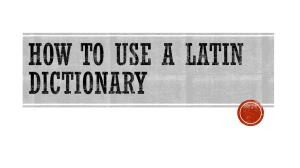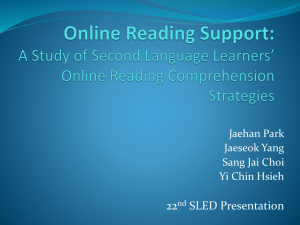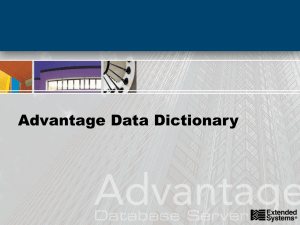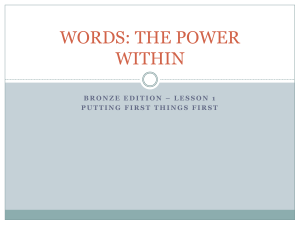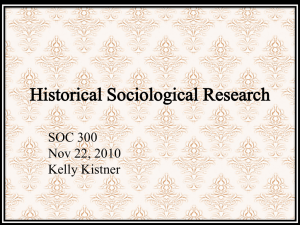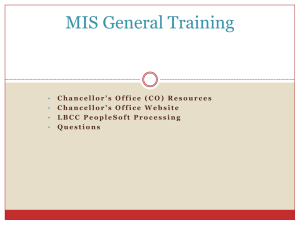Chapter 2
advertisement
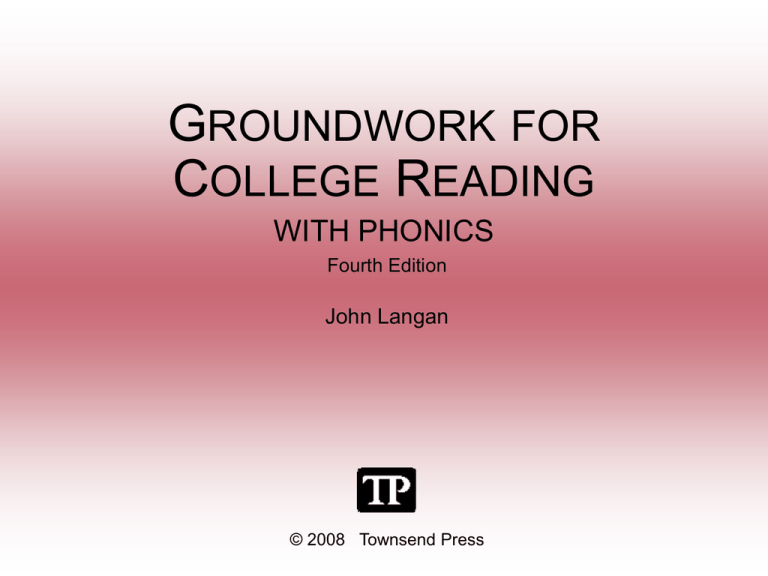
GROUNDWORK FOR COLLEGE READING WITH PHONICS Fourth Edition John Langan © 2008 Townsend Press Part II, Chapter Two: Dictionary Use THIS CHAPTER IN A NUTSHELL • You should own both a paperback and a hardbound dictionary. • You can use a computer to visit online dictionaries. • Use spelling hints to help you look up in the dictionary a word you cannot spell. • A dictionary entry will tell you how a word is spelled and pronounced and give you the various meanings of the word. It will also provide other helpful information about words. OWNING YOUR OWN DICTIONARY You will benefit by owning two dictionaries: • a paperback dictionary you can carry with you • a desk-sized, hardcover dictionary that you keep in the room where you study ONLINE DICTIONARY • If you have a computer connected to the Internet, you can look up words online. • Look on page 175 of your textbook for information about online dictionaries. FINDING WORDS IN THE DICTIONARY Using Guidewords to Find a Word Guidewords are the two words at the top of each dictionary page. • The first guideword is the first word on that page. • The second is the last word on the page. • All the word entries on that page fall alphabetically between the two guidewords. FINDING WORDS IN THE DICTIONARY Finding a Word You Can’t Spell Hint 1: If you’re not sure about the vowels in a word, you will have to experiment. • Vowels often sound the same. So try an i in place of an a, an i in place of an e, and so on. • If, for example, you don’t find a word that sounds as if it begins with pa, try looking under pe, pi, po, pu, or py. FINDING WORDS IN THE DICTIONARY Finding a Word You Can’t Spell Hint 2: These groups or combinations of letters often sound alike. • If your word isn’t spelled with one of the letters in a pair or group shown below, try another in the same pair or group. • For example, if it isn’t spelled with a k, it might be spelled with a c. c/k c/s f/v/ph g/j qu/kw/k s/c/z sch/sc/sk sh/ch shun/tion /sion w/wh able/ible ai/ay al/el/le ancy/ency ate/ite au/aw ea/ee er/or ie/ei ou/ow oo/u y/i/e FINDING WORDS IN THE DICTIONARY Finding a Word You Can’t Spell Hint 3: Consonants are sometimes doubled in a word. • If you can’t find your word with a single consonant, try doubling it. LEARNING FROM A DICTIONARY ENTRY Sample Dictionary Entry All of the following information may be provided in a dictionary entry: 1 Spelling and Syllables 2 Pronunciation Symbols and Accent Marks 3 Parts of Speech 4 Irregular Forms of Words 5 Definitions (Meanings) 6 Synonyms LEARNING FROM A DICTIONARY ENTRY 1 Spelling and Syllables • The dictionary first gives the correct spelling and syllable breakdown of a word. • Dots separate the syllables from one another. In the entry above, distress is divided into two syllables: dis • tress LEARNING FROM A DICTIONARY ENTRY 1 Spelling and Syllables How many syllables are in these words? harsh ru•mor ex•cep•tion in•stall•ment LEARNING FROM A DICTIONARY ENTRY 1 Spelling and Syllables How many syllables are in these words? harsh ru•mor ex•cep•tion in•stall•ment 1 syllable 2 syllables 3 syllables 3 syllables LEARNING FROM A DICTIONARY ENTRY 2 Pronunciation Symbols and Accent Marks • The information in parentheses shows how to pronounce the word. • It includes two kinds of symbols: pronunciation symbols and accent marks. LEARNING FROM A DICTIONARY ENTRY 2 Pronunciation Symbols and Accent Marks Pronunciation Key • The i in distress has the symbol µ. This tells you that the i is pronounced like the i in the word sit. • The e in distress is pronounced like the e in what word? LEARNING FROM A DICTIONARY ENTRY 2 Pronunciation Symbols and Accent Marks Pronunciation Key • The i in distress has the symbol µ. This tells you that the i is pronounced like the i in the word sit. • The e in distress is pronounced like the e in what word? ten LEARNING FROM A DICTIONARY ENTRY 2 Pronunciation Symbols and Accent Marks • The dark line after the final s in distress is a bold accent mark. It shows which syllable has the strongest stress. • Which syllable is most strongly stressed in each of the words below? LEARNING FROM A DICTIONARY ENTRY 2 Pronunciation Symbols and Accent Marks • The dark line after the final s in distress is a bold accent mark. It shows which syllable has the strongest stress. • Which syllable is most strongly stressed in each of the words below? first second second first fourth LEARNING FROM A DICTIONARY ENTRY 3 Parts of Speech Every word in the dictionary is either a noun, a verb, an adjective, or another part of speech. In dictionary entries, the parts of speech are shown by letters in italics. In the entry for progress, the abbreviations n. and v. tell us that progress is both a noun and a verb. LEARNING FROM A DICTIONARY ENTRY 3 Parts of Speech Here are the most common abbreviations for parts of speech: n. — noun pron. — pronoun adj. — adjective adv. — adverb v. — verb conj. —conjunction prep. — preposition interj. — interjection LEARNING FROM A DICTIONARY ENTRY 4 Irregular Forms of Words When other forms of a word are spelled in an irregular way, those forms are shown in the dictionary entry. Here are some examples: LEARNING FROM A DICTIONARY ENTRY 5 Definitions • Words often have more than one meaning. The dictionary lists the different meanings. • You can tell which definition fits a given sentence by the meaning of the sentence. LEARNING FROM A DICTIONARY ENTRY 5 Definitions Choose the dictionary meaning that best fits the sentence. I suspect the exam is going to be all essay questions. suspect: 1. To regard as likely or probable 2. To distrust or doubt 3. To think of as guilty without proof The doctor instructed the nurse to take my blood pressure. instruct: 1. To teach a subject or skill 2. To give orders to; direct LEARNING FROM A DICTIONARY ENTRY 5 Definitions Choose the dictionary meaning that best fits the sentence. I suspect the exam is going to be all essay questions. suspect: 1. To regard as likely or probable 2. To distrust or doubt 3. To think of as guilty without proof The doctor instructed the nurse to take my blood pressure. instruct: 1. To teach a subject or skill 2. To give orders to; direct LEARNING FROM A DICTIONARY ENTRY 6 Synonyms Dictionary entries sometimes list synonyms. • A synonym is a word whose meaning is similar to that of another word. — For example, two synonyms for the word help are aid and assist. • A thesaurus is a collection of synonyms and antonyms (words with opposite meanings). — You can buy a paperback thesaurus in a bookstore. — Or you can access a free thesaurus online. — In addition, some computers have a built-in thesaurus. CHAPTER REVIEW In this chapter, you learned the following: • It helps to own two dictionaries. One should be a small paperback you can carry with you. The other should be a large hardbound version for use at home. • If you have a computer, you can easily find a dictionary online. • Guidewords and the spelling hints on page 43 will help you find a word in the dictionary. • A dictionary entry will tell you 1) how a word is spelled and broken into syllables; 2) how the word is pronounced; 3) the word’s part (or parts) of speech; 4) other forms of the word; 5) definitions of the word. Some dictionaries will also list synonyms—words that mean nearly the same as the word. The next chapter—Chapter 3—will show you how you can use context, rather than a dictionary, to figure out the meaning of a word.

